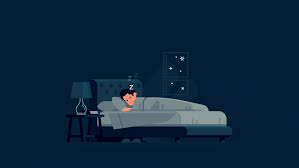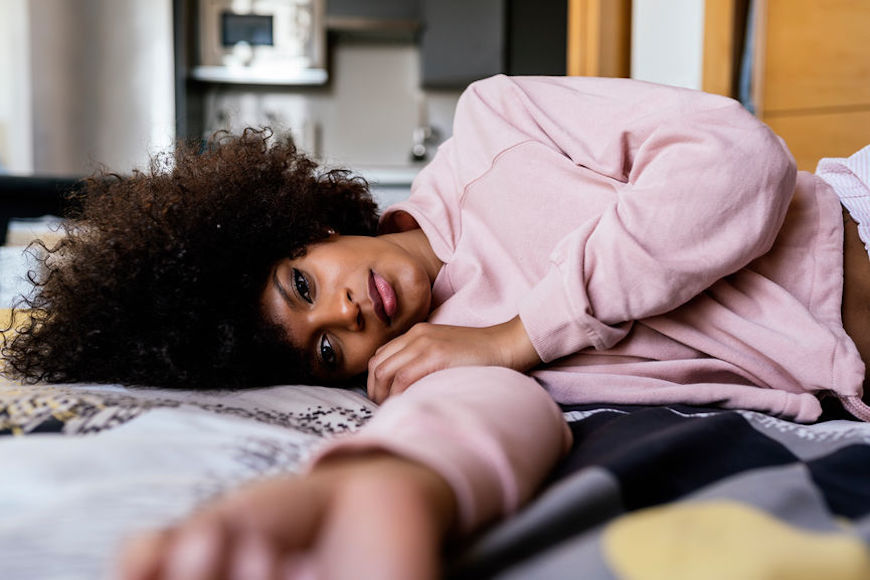Do you wake up in the morning feeling anxious and overwhelmed? If so, you are not alone. Many people experience morning anxiety, which can be caused by a number of factors. In this blog post, we will discuss what morning anxiety is, what causes it, and how to deal with it. We will also provide some helpful tips for getting your day started off on the right foot!
Contents
What Is Morning Anxiety?
 Morning anxiety is a feeling of nervousness, fear, or worry that can happen when you wake up in the morning. It is often accompanied by a sense of dread or foreboding about the day ahead. For some people, this feeling is so strong that it can make it hard to get out of bed and start their day.
Morning anxiety is a feeling of nervousness, fear, or worry that can happen when you wake up in the morning. It is often accompanied by a sense of dread or foreboding about the day ahead. For some people, this feeling is so strong that it can make it hard to get out of bed and start their day.
This anxiety is different from the anxiety you may feel at other times of the day. It is not simply a case of nerves or being stressed about an upcoming event. Rather, it is a more persistent feeling that can last for hours or even all day long.
In fact, researchers have studies that show that morning anxiety is a real phenomenon. One study found that people with a generalized anxiety disorder (GAD) were more likely to experience morning anxiety than those without GAD. Also, people with GAD were more likely to report that their morning anxiety was severe and caused them distress.
So, if you wake up feeling anxious or worried, you are not alone. Morning anxiety is a real thing. And it can be tough to deal with. But there are some things you can do to ease your anxiety and start your day off on a better foot.
What Are The Signs Of Morning Anxiety?
There are a few signs that may indicate you’re experiencing morning anxiety, including:
- Waking up earlier than usual
- Feeling restless or irritable
- Having trouble falling back asleep
- Feeling tense or on edge
- Sweating
- Heart palpitations
- Shortness of breath
- Headache
- Difficult controlling your worry
These symptoms of morning anxiety are actually very similar to the symptoms of panic attacks. So, it is essential to be able to distinguish between the two. Panic attacks tend to peak within minutes, whereas anxiety may last for hours. But, like real anxiety, morning anxiety can be really difficult to deal with.
It can make it hard to concentrate on anything else and make you feel really exhausted by the end of the day. So, it is essential to find ways to manage morning anxiety.
What Causes Morning Anxiety?
 The causes of this condition are not fully understood. However, some experts believe that it may be the result of a combination of genetic and environmental factors. It is also thought to be more common in people who have certain personality traits. Such as perfectionism or a need for control.
The causes of this condition are not fully understood. However, some experts believe that it may be the result of a combination of genetic and environmental factors. It is also thought to be more common in people who have certain personality traits. Such as perfectionism or a need for control.
There are several possible triggers for morning anxiety. For some people, it may be caused by stressors in their life. Such as work or family responsibilities. For others, it may be due to an underlying medical condition. Such as an anxiety disorder or depression. It is also thought that certain medications may contribute to the condition.
Moreover, “stress hormone” is also one of the reasons. It is known that when we wake up in the morning, our body’s cortisol levels are at their highest. Cortisol is a hormone that helps us deal with stress. However, when we have too much of it, it can cause anxiety and other problems.
So, when you eat or drink something that contains caffeine, it can make your morning anxiety worse. That’s why it’s important to avoid caffeine if you’re trying to reduce your anxiety. In fact, some experts suggest that if you go to bed anxiously or have trouble sleeping. Then, it can also make you wake up anxious in the morning.
Therefore, there are several factors that cause morning anxiety. And it is important to find out the root cause of your morning anxiety in order to treat it effectively.
How Does It Impact Your Day?
It is obvious that if your anxiety is bad enough, it can make it hard to get out of bed in the morning. For some people, the feeling of dread and unease can be so overwhelming that they are unable to function normally. This can result in taking many sick days or being late for work/appointments. In more severe cases, it has numerous negative consequences. These include:
- Decreased productivity
- Isolation
- Loss of interest in activities
- Intense fear
- Physical symptoms such as a racing heart, sweating, and nausea
- Lack of interest in sex
- Difficulty concentrating
- Poor decision-making
- Irritability
- Increased use of alcohol or drugs to self-medicate.
These are actually serious and can have a profound impact on your quality of life. If you are struggling with morning anxiety, it is important to seek help from a mental health professional. Otherwise, this condition can quickly spiral out of control.
Moreover, morning anxiety can be a symptom of an underlying condition, such as depression, panic disorder, or social anxiety disorder. So, it might get better on its own or might require treatment. If you are struggling with morning anxiety, the best thing to do is talk to a mental health professional. They can help you figure out what is causing your anxiety and recommend treatment options.
How To Treat Morning Anxiety?
 It is impossible to live with anxiety and not have it affect how you feel in the morning. For some people, anxiety is at its worst when they first wake up. If you’re one of those people, it is important to seek help and find ways to cope with your anxiety.
It is impossible to live with anxiety and not have it affect how you feel in the morning. For some people, anxiety is at its worst when they first wake up. If you’re one of those people, it is important to seek help and find ways to cope with your anxiety.
Here are a few professional treatment options:
Psychotherapy
Psychotherapy is a short-term, goal-oriented therapy that helps people learn how to better manage their anxiety. It is also known as talk therapy. This therapy especially works in reference to Cognitive-Behavioral Therapy. CBT is a type of psychotherapy that helps people learn how to change their thinking and behavior in order to better manage their anxiety.
It works by helping people identify and correct the negative thinking patterns that contribute to their anxiety. CBT also teaches people healthy coping skills and stress management techniques. In fact, it is believed that CBT is one of the most effective treatments for anxiety.
Exposure Therapy
Exposure therapy is a type of CBT that helps people faced with anxiety by gradually exposing them to the things they fear in a safe and controlled environment. This therapy can be done in-person or virtually, depending on what you’re comfortable with.
The goal of exposure therapy is to help people confront their fears and learn to manage their anxiety in a healthy way. Moreover, ERP is highly effective in treating anxiety disorders.
Medication
 There are several types of medication that can be used to treat anxiety. The most common type of medication is an anti-anxiety medication. These drugs work by reducing the symptoms of anxiety.
There are several types of medication that can be used to treat anxiety. The most common type of medication is an anti-anxiety medication. These drugs work by reducing the symptoms of anxiety.
Other types of medication include beta-blockers and antidepressants. Beta-blockers help to control the physical symptoms of anxiety, such as trembling and sweating. Antidepressants work by balancing the chemicals in your brain that contribute to anxiety.
While medication can be effective in treating anxiety, it is important to remember that it is not a cure. Medication should be used in conjunction with other treatment options, such as therapy and exposure therapy. Because it can have several side effects that can be difficult to manage.
Support Groups
Support groups are always helpful and it can be nice to know you’re not alone in your anxiety. If you can’t find one that suits you, consider starting one yourself. There are a few things you should keep in mind when looking for or starting a support group:
- People in the group should have similar experiences to you
- The group should be led by a qualified therapist or any mental health professional
- The group should have a set structure
- You should feel comfortable with the people in the group
- The group should be confidential
Keep these things in mind and you’ll be sure to find or start a great support group!
So, these are some professional treatment options that can help you overcome morning anxiety. Also, it is important to understand that you are not alone in your anxiety and there are people who can understand you and help you out. Do not be afraid to ask for help when needed! There might be a light at the end of the tunnel after all.
What Are Some Self-Help Strategies To Deal?
When you are feeling anxious, there are a number of things you can do to help yourself feel better. And, with self-help strategies, you don’t have to rely on anyone else to help you feel better. You can do it yourself!
Here are some self-help strategies for dealing with morning anxiety:
Get out of bed and move around
 When you’re feeling anxious, getting out of bed and moving your body can help release tension and ease your anxiety symptoms. Taking a walk, doing some gentle stretching, or even just moving around your room can help you feel better. Because, if you wake up and just feel anxious and stressed, lying in bed is only going to make those feelings worse.
When you’re feeling anxious, getting out of bed and moving your body can help release tension and ease your anxiety symptoms. Taking a walk, doing some gentle stretching, or even just moving around your room can help you feel better. Because, if you wake up and just feel anxious and stressed, lying in bed is only going to make those feelings worse.
Deep breathing
Taking deep breaths is a simple but effective way to calm anxiety. When you’re feeling anxious, take a few deep breaths and focus on your breath going in and out. You may find it helpful to count to four as you breathe in and then count to four as you breathe out. In fact, deep breathing is so effective that it’s often used as a relaxation technique in meditation and yoga.
Visualize a calm place
When you’re feeling anxious, close your eyes and visualize a calm, relaxing place. It can be anywhere you want – a beach, the mountains, a forest, or even your own backyard. Imagine yourself in that place and take in all the details around you. What do you see? What do you hear? What do you smell? In addition, a visualization is actually a form of meditation, so it can help to calm and focus your mind.
Talk to someone you trust
If you’re feeling anxious, talking to someone you trust – whether it’s a friend, family member, therapist, or counselor – can help. Talking about what’s going on can help you feel better and may even give you some insight into what’s causing your anxiety. In addition, the support of someone you trust can be incredibly helpful when you’re feeling anxious.
Identify your triggers
In the morning, it may be helpful to take a few minutes to identify what’s triggering your anxiety. What are the thoughts or situations that make you feel anxious? Once you know what your triggers are, you can start to work on avoiding them or managing them in a better way. Moreover, understanding your triggers can help you to understand your anxiety more and may even help you to find better ways to deal with it.
Get Enough Sleep
 Morning anxiety can be caused by not getting enough sleep. When you’re tired, your body is in a state of stress and this can make anxiety symptoms worse. So, if you’re not getting enough sleep, try to get more rest. In addition, avoid caffeine and alcohol before bed as these can also interfere with sleep. Also, try to establish a regular sleep schedule by going to bed and waking up at the same time each day.
Morning anxiety can be caused by not getting enough sleep. When you’re tired, your body is in a state of stress and this can make anxiety symptoms worse. So, if you’re not getting enough sleep, try to get more rest. In addition, avoid caffeine and alcohol before bed as these can also interfere with sleep. Also, try to establish a regular sleep schedule by going to bed and waking up at the same time each day.
Be Patient With Yourself
Anxiety already makes people feel out of control and anxious. So, it’s important to be patient with yourself when you’re dealing with anxiety. Don’t expect yourself to be perfect or to never feel anxious again. Just take things one day at a time and focus on taking care of yourself.
If you’re struggling with morning anxiety, know that you’re not alone. Millions of people around the world deal with anxiety every day. But, with some self-help strategies and a little patience, you can start to feel better. So start your journey today!
Conclusion
Conclusively, morning anxiety is a real and serious thing. It can make getting out of bed and starting your day feels impossible. But it doesn’t have to be this way. There are things you can do to ease morning anxiety and make your mornings better. Talk to your doctor, try some relaxation techniques, get enough sleep, and avoid caffeine. With a little effort, you can take control of your mornings and feel better overall.
For more information, please contact MantraCare. Anxiety is a common mental health condition characterized by persistent feelings of worry, fear, and apprehension. If you have any queries regarding Online Anxiety Counseling experienced therapists at MantraCare can help: Book a trial Anxiety therapy session


